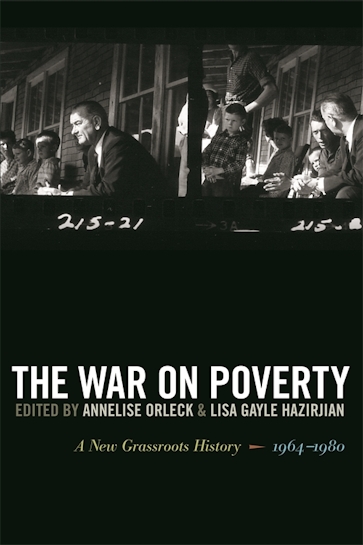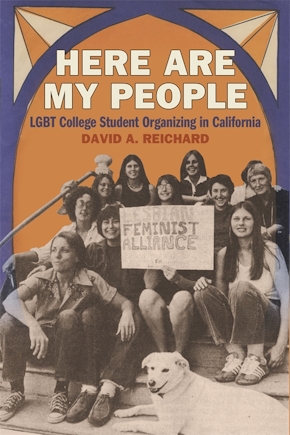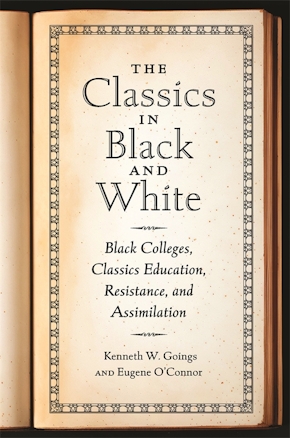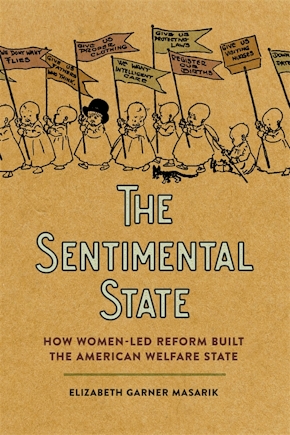The War on Poverty
A New Grassroots History, 1964-1980
Title Details
Pages: 480
Illustrations: 13 b&w photos
Trim size: 6.000in x 9.000in
Formats
Paperback
Pub Date: 11/01/2011
ISBN: 9-780-8203-3949-8
List Price: $36.95
Hardcover
Pub Date: 11/01/2011
ISBN: 9-780-8203-3101-0
List Price: $120.95
Related Subjects
HISTORY / United States / 20th Century
SOCIAL SCIENCE / Poverty & Homelessness
POLITICAL SCIENCE / Public Policy / Social Services & Welfare
The War on Poverty
A New Grassroots History, 1964-1980
Skip to
- Description
- Reviews
- Contributors
Lyndon Johnson’s War on Poverty has long been portrayed as the most potent symbol of all that is wrong with big government. Conservatives deride the War on Poverty for corruption and the creation of “poverty pimps,” and even liberals carefully distance themselves from it. Examining the long War on Poverty from the 1960s onward, this book makes a controversial argument that the programs were in many ways a success, reducing poverty rates and weaving a social safety net that has proven as enduring as programs that came out of the New Deal.
The War on Poverty also transformed American politics from the grass roots up, mobilizing poor people across the nation. Blacks in crumbling cities, rural whites in Appalachia, Cherokees in Oklahoma, Puerto Ricans in the Bronx, migrant Mexican farmworkers, and Chinese immigrants from New York to California built social programs based on Johnson’s vision of a greater, more just society. Contributors to this volume chronicle these vibrant and largely unknown histories while not shying away from the flaws and failings of the movement—including inadequate funding, co-optation by local political elites, and blindness to the reality that mothers and their children made up most of the poor.
In the twenty-first century, when one in seven Americans receives food stamps and community health centers are the largest primary care system in the nation, the War on Poverty is as relevant as ever. This book helps us to understand the turbulent era out of which it emerged and why it remains so controversial to this day.
Makes an extremely significant intervention into several literatures—on social movements, on domestic policy, and on local government and power structures. It shares both a strong point of view and a clear commitment not to oversimplify or romanticize the grassroots activism it depicts, and this combination makes it convincing and, at times, gripping. The fact that the book treats civil rights activism among Mexican Americans, Indians, and Asian Americans is particularly attractive.
—Linda Gordon, winner of the Bancroft Prize for Dorothea Lange: A Life Beyond Limits
The essays in this exciting collection bring to life the War on Poverty at the grassroots, where it was really fought. They emphasize the interpenetration of the poverty war and civil rights movement and highlight the energy unleashed by the commitment to the 'maximum feasible participation' of the poor. Annelise Orleck’s introduction provides one of the best overviews of the War on Poverty ever written, and her stunning conclusion offers a measured, reasoned defense of the program’s achievements and legacy—a message needed now more than ever.
—Michael B. Katz, University of Pennsylvania
Contributors to the volume chronicle vibrant and largely unknown histories while not shying away from the flaws and failings of the movement. . . .This book helps readers to understand the turbulent era out of which it emerged and why it remains so controversial to this day.
—Bob Edmonds, McCormick Messenger
—Midwest Book Review
[The War on Poverty] is history, not economic or political theory, and its power comes from its empirical approach . . . The stories contained in this volume of how its battles have been lost and won can help us see how it might be fought more successfully in the future.
—Duncan Richter, Studies in American Culture
—Sean P. Cunningham, Southwestern Historical Quarterly
Amy Jordan
Christina Greene
Daniel M. Cobb
Greta de Jong
Guian A. McKee
Karen M. Tani
Kent B. Germany
Laurie B. Green
Marc S. Rodriguez
Rhonda Y. Williams
Robert Bauman
Susan Youngblood Ashmore
Thomas Kiffmeyer
Wesley G. Phelps
William Clayson
Adina Black



